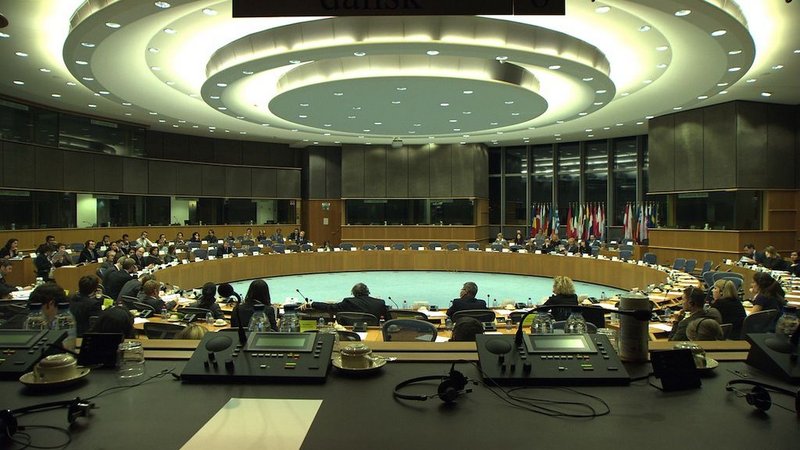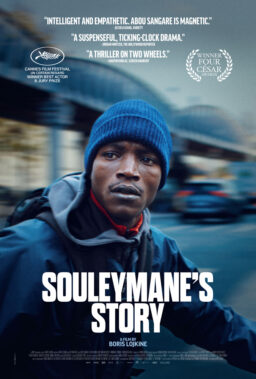A regional film festival done right, the True/False Film Fest in Columbia, Missouri turns documentaries into an unlikely catalyst for a weekend jammed with community festivities. Wanting more than a showcase for conventional docs dispensing single servings of social awareness, the festival’s programmers hand-pick 40 features that collectively stretch the boundaries of the genre. Seems like heady stuff to drop on a hometown crowd of 30,000 attendees, though the University of Missouri community makes for a game audience. The organizers shrewdly dress their highbrow mission in a carnivalesque atmosphere, with buskers playing music sets before each screening and raucous parties for guests and locals alike. Only nine years old, True/False is already a favorite venue of filmmakers for its unaffected down-home vibe.
The welcoming atmosphere allows True/False to confidently present highly challenging films, like “Vivan Las Antipodas!” by the festival’s True Vision award winner, Victor Kossakovsky. This playfully experimental and gorgeously shot film juxtaposes life at five antipodes, or opposite ends of the Earth (i. e. Hawaii and Botswana; Patagonia and Shanghai). The film even turns its footage upside down or sideways when transitioning from one end of the world to the other. Languidly observant and opaque in meaning, the film finds poetry in global connections, like when a shot of an ailing butterfly fluttering on a Spanish rock cuts to the massive carcass of a beached whale on a New Zealand beach.
Similarly enigmatic, Nicholas Geyrhalter’s impressive “Abendland” is a compendium of scenes depicting work done at night all across the European Union: diplomats arguing at an evening plenary, Dutch prostitutes servicing men in a kitschy brothel, Spanish guards patrolling the Gibraltar border, and techno DJs blasting aural ecstasy across a packed stadium. The sheer breadth of access to so many vivid nocturnal scenes is staggering, offering a view of modern Europe that’s eerily dystopic yet enthralling in its dark energies.
But if there was a film that lived up to the festival’s “True/False” label, it would be “The Ambassador” by Mads Brugger, a Danish bad boy who’s the documentary answer to Lars Von Trier. Brugger, who infiltrated North Korea as a phony cultural ambassador in “The Red Chapel,” goes even further by impersonating a diplomat in the highly unstable Central African Republic. His phony mission exposes the process by which foreign hucksters exploit their ambassadorships to trade in blood diamonds, pocketing millions in an unfathomable pool of corruption. As if to flaunt the absurdity of it all, Brugger plays his part in garish caricature, dressing in expensive suits while demanding his hosts provide him with a pygmy servant. The movie teeters over a pit of nihilistic smugness, but as we come to realize the degree to which this “Borat”-like adventure puts Brugger’s life in genuine peril, the chip on his shoulder seems more like a protective shield as he bluffs his way to an improbable outcome.
Disruptive behavior also figures in two documentaries profiling acclaimed artists. Alison Klayman’s “Ai Weiwei: Never Sorry” chronicles how Ai Weiwei, China’s most renowned artist, became one of its most brazen human rights activists, leading to his beating and detainment at the hands of the authorities. More than a riveting character study, the film reflects how one man challenges the unjust realities that govern Chinese society. “Marina Abramovic: The Artist Is Present” is a fawning look at one of the world’s premier performance artists as she prepares the landmark 2010 exhibition at the Museum of Modern Art that turned her into a household name. Both these films had premiered to acclaim at Sundance, are slated for theatrical or television release, and easily won over the True/False crowds.
But there were two smaller films that accomplished even more in turning documentary character studies into truly cinematic experiences. “Only the Young” is an intimate portrait of the lives of three unconventional Christian teens involved in the Southern California skate punk scene. “The Argentine Lesson” tracks a budding romance between two children of Polish ancestry living in Argentina. Highly attentive to their unique subcultures, these patient films capture small moments that seem too good to be true yet too genuine to be staged or scripted, with an exceptional lyricism not found in most fiction features.
Another film explores a more sinister side of today’s youth, reflected through the screens of digital video and online culture. “Me @ the Zoo” explores the strange phenomenon of Chris Crocker, an unlikely celebrity who achieved notoriety for his “Leave Britney Alone” viral video, in which he made a tearful plea on behalf of his teen idol Britney Spears. With minimal commentary, the film tells its story by weaving together a stunning array of found footage, from Crocker’s videos to the numerous responses they inspired both online and in the media. They tell a fascinating story of how an alienated Appalachian queer teenager became an internet sensation, only to get lost in the vicissitudes of the same disposable celebrity culture that afflicted his beloved Spears.
Approaching the other end of the True/False equation, the festival makes space for the odd fiction film that incorporates documentary elements. “V/H/S” is an anthology of horror shorts filmed as amateur home videos. The film updates the fake documentary/found footage subgenre made famous by “The Blair Witch Project” by incorporating the newest technologies of everyday voyeurism. In one short, three men film their sexual exploits with a micro-camera embedded in one guy’s glasses, only to have their plan viciously backfire. Another story is played out over a series of online chats between long distance lovers, as the boyfriend notices a shadowy figure lurking within his girlfriend’s chat window.
The scare effects in these shorts often amount to 21st century tech updates of the old off-screen shocks pioneered by Val Lewton. They also trade in the longstanding misogyny of horror films, as women characters are either helpless foils or devouring demons punishing male libidinal urges. Within these newfangled gorefests, the real horror lies in their disturbing visions of a generation addicted to constantly recording itself. At True/False, even fake images hold truths about the use and abuse of documentary in our lives.












